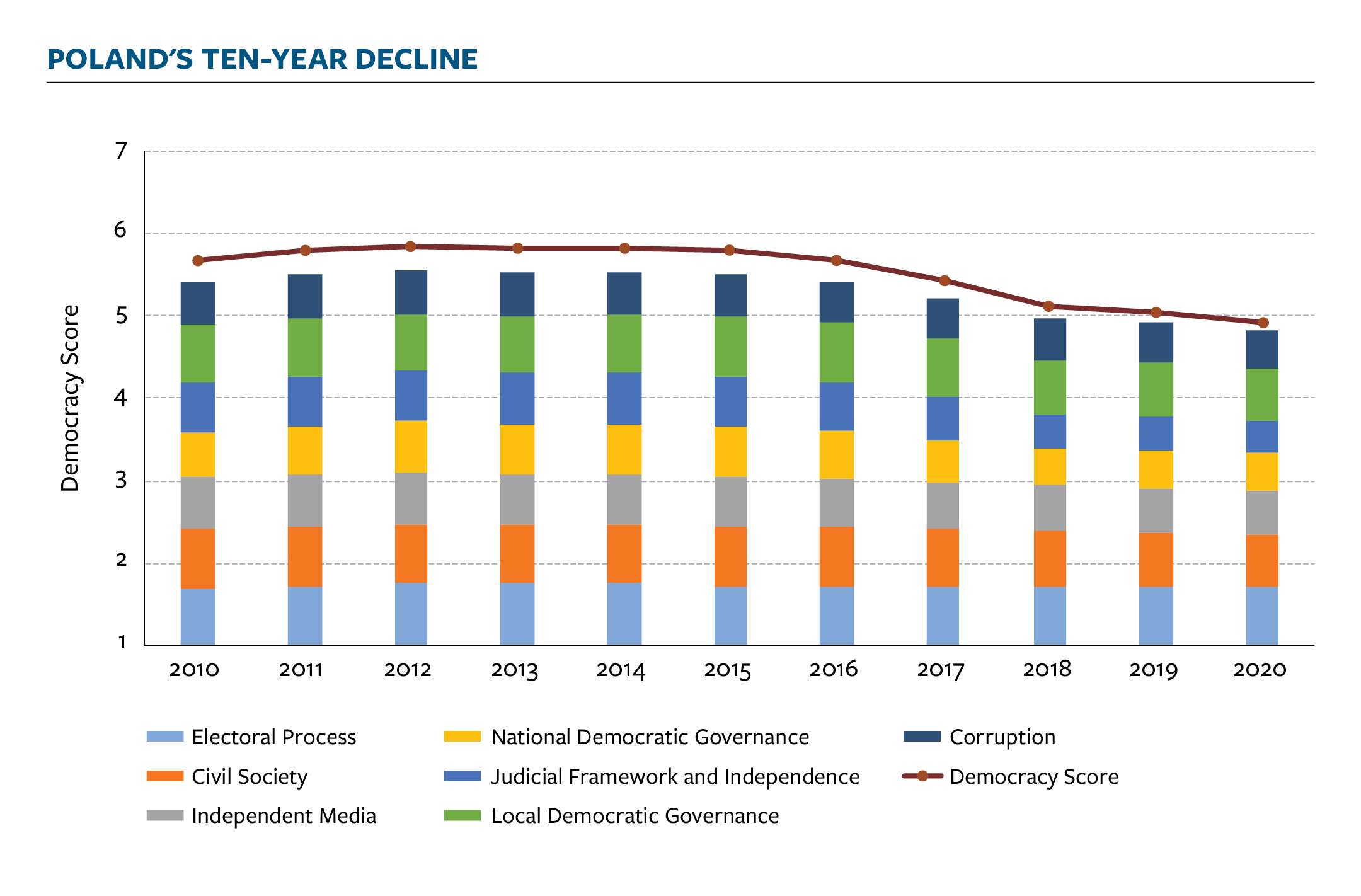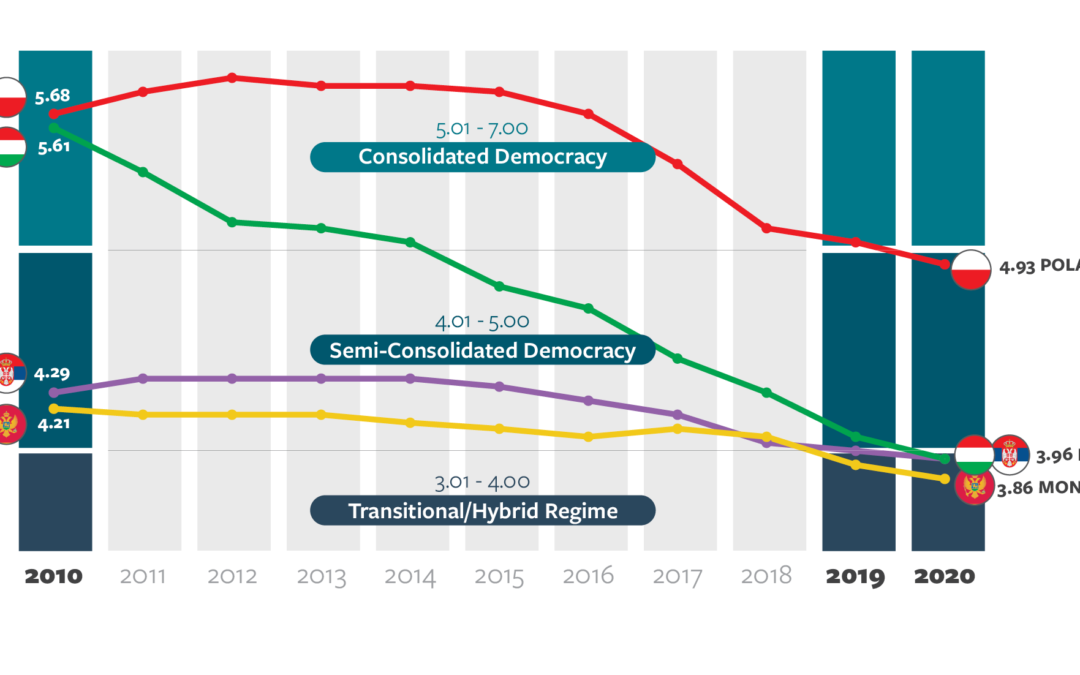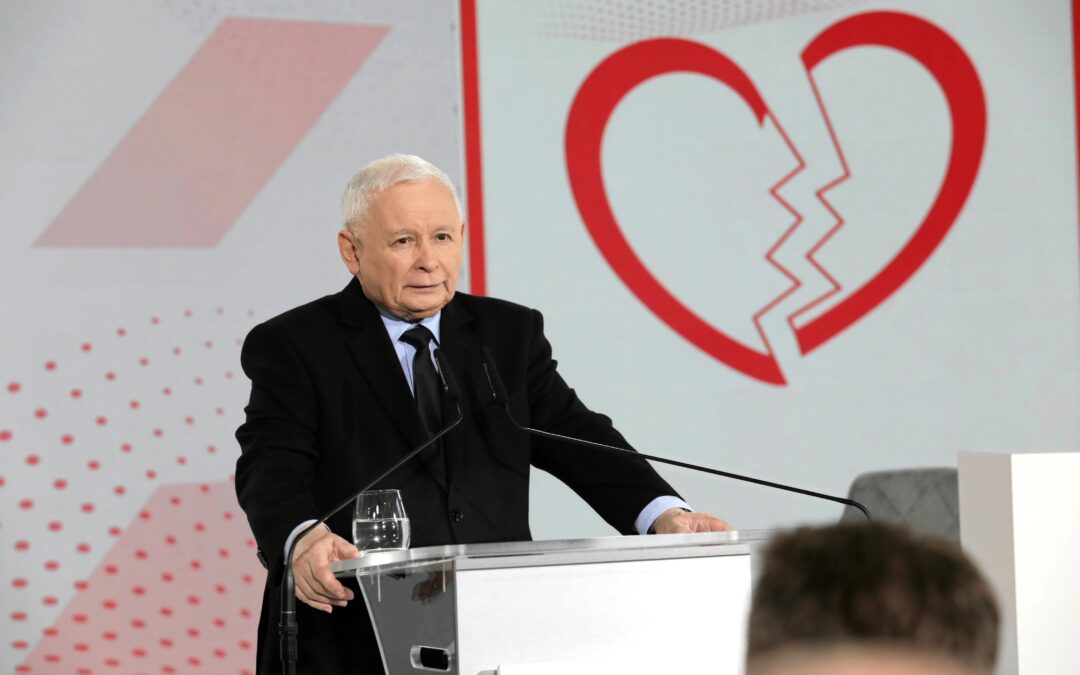Poland has again fallen in the annual index of democracy compiled by Freedom House, a US-based NGO. As a result, the country is no longer ranked in the highest category of “consolidated democracy”, according to the report’s methodology. Instead, it is classified as a “semi-consolidated democracy”.
Poland therefore becomes only the second EU member state included in the report to lose its full democratic status. The other, Hungary, lost its “consolidated democracy” rating five years ago, and has now fallen far enough to no longer be classified as a democracy at all.
Overall, the Nations in Transit report – which has since 1995 examined the progress of democracy in 29 former communist states and is funded by the US Agency for International Development – paints a pessimistic image of the region, which includes Central and Eastern Europe and Central Asia.
NEW REPORT: The Nations in Transit 2020 report recorded fewer democracies in Europe and Eurasia than ever in the history of the report. https://t.co/xP4jJZ2NKx #NationsInTransit pic.twitter.com/hF15nDQyLU
— Freedom House (@freedomhouse) May 6, 2020
It finds that the number of democracies is now at its lowest point in the 25-year history of the report, having declined by a third over the last decade. The index’s average democracy score for all countries surveyed has fallen for 16 years in a row.
In the case of Poland, the decline began slowly in 2012, but accelerated from 2015, the year that the currently ruling Law and Justice (PiS) party came to power.
Over the last five years, Poland’s decline in the category of “judicial framework and independence” has been the largest ever recorded for that indicator by Freedom House, as PiS has undertaken a contested and controversial overhaul of the judiciary.

In its report for 2020, Freedom House notes that “Poland continues to stand out for the systematic, targeted, and aggressive nature of the government’s attacks on judicial independence”, as PiS seeks to “convert [courts] into a pliant political tool”.
“Such an attack on a core tenet of democracy…would have been unimaginable in Europe before PiS made it a reality,” warn the authors. “If Poland continues on this course, it will join hybrid regimes and autocracies that routinely mete out politicised justice.”
Freedom House also raises concern about “a pattern of rushed lawmaking and restrictions on the opposition’s participation [that] has made a mockery of the legislative process….[with] important amendments adopted without consultation, in the dark of night”.
“Neither Poland nor Hungary has faced repercussions for damaging the rule of law,” note the authors, while “US president Donald Trump has failed to stand up for democracy in the region…[and] has embraced the governments of Hungary and Poland”.
Freedom House’s report is the latest of many rankings of freedom and democracy to have found both to be in decline in Poland. In the latest World Press Freedom Index, released last month, Poland fell to its lowest ever position of 62nd, following five consecutive years of decline from a high of 18th.
During PiS’s first four years in office, Poland recorded the biggest decline of any country in the World Justice Project’s Rule-of-Law Index and dropped six places in the Economist Intelligence Unit’s Democracy Index (where it is now classified as a “flawed democracy”).
Last year, in the Index of Economic Freedom compiled by the Heritage Foundation, a conservative US think tank, Poland fell to 46th position, down from 39th in 2016. In the Cato Institute’s Human Freedom Index it has fallen from a high of 21st in 2011 to 40th last year.
Poland’s government, however, argues that its controversial overhaul of the judiciary, public media and other institutions is necessary to sweep away the remnants of the former communist regime.
PiS and its leader, Jarosław Kaczyński, claim that after 1989 Poland did not become truly independent. Instead, the communist elites and some elements among the opposition came to an arrangement that left “post-communists” continuing to hold influential positions in politics, the judiciary, the economy and the media.
“Our current policy is aimed at changing the post-communist order in Poland, and the beneficiaries of this system are fighting to maintain their influence and do not recognise us,” said Kaczyński recently.
When its methods face criticism from international institutions and organisations, PiS and its supporters argue variously that outside bodies do not understand the realities of Poland’s situation, that they are politically motivated, or that, due to prejudices against eastern EU members, they hold them to different standards than western states.
But Zselyke Csaky, Freedom House’s research director for Europe and Eurasia, notes that their reports and ratings are compiled by local experts, not outsiders. As for claims of double standards, she points to the fact that her organisation’s Freedom in the World report, which came out in March, gave the United States a similar score to Poland and Croatia.
Credit for all images: Freedom House/Nations in Transit 2020

Daniel Tilles is editor-in-chief of Notes from Poland. He has written on Polish affairs for a wide range of publications, including Foreign Policy, POLITICO Europe, EUobserver and Dziennik Gazeta Prawna.



















